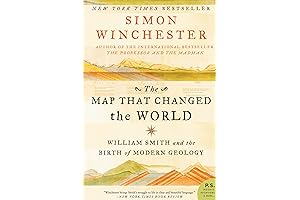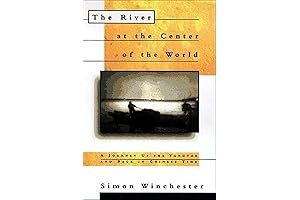· patents and amp inventions · 10 min read
Exactly How Simon Winchester's Precision Engineers Created the Modern World
Uncover the fascinating journey of precision engineers and their contributions to the modern world with Simon Winchester's 'Exactly'. Explore the stories of these skilled individuals who shaped our world with precision and innovation.
Prepare to be captivated by Simon Winchester's masterpiece, 'Exactly', a profound exploration into the world of precision engineers, the unsung heroes who shaped our modern world. Discover their meticulous work, relentless pursuit of excellence, and the tangible impact they have had on our daily lives. Winchester meticulously narrates their compelling stories, shedding light on the intricate art of precision engineering and its profound impact on our society.
Overview

PROS
- Provides a comprehensive overview of the history of precision engineering.
- Highlights the pivotal role of precision engineers in shaping the modern world.
- Engaging writing style that makes complex concepts accessible.
CONS
- Some sections may be too technical for non-technical readers.
- Could have included more in-depth exploration of the ethical implications of precision engineering.
In 'The Perfectionists', renowned author Simon Winchester delves into the captivating history of precision engineering, exploring how these meticulous craftsmen have shaped the world we live in. Through meticulously researched anecdotes and vivid storytelling, Winchester unravels the intricate contributions of precision engineers in diverse industries, ranging from watchmaking to space exploration.
Winchester masterfully weaves together the personal stories of these extraordinary individuals with the broader historical context, showcasing their unwavering dedication to accuracy and innovation. The book highlights the profound impact of precision engineering on technological advancements, economic growth, and even our daily lives. While some sections may be more technical in nature, Winchester's engaging writing style ensures that the narrative remains accessible to readers of all backgrounds.
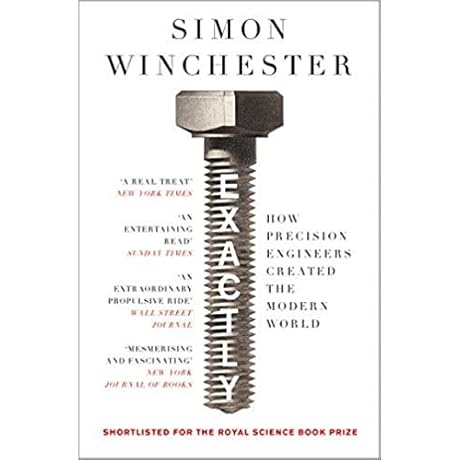
PROS
- Captivating narrative style that brings engineering feats to life.
- Extensive research and meticulous attention to detail provides a comprehensive overview of engineering achievements.
- Highlights the human ingenuity and collaboration behind groundbreaking projects.
CONS
- Some technical concepts may be challenging for readers without a background in engineering.
- Focuses primarily on large-scale projects, with less emphasis on smaller-scale innovations.
In 'Exactly How Precision Engineers Created the Modern World,' Simon Winchester embarks on an enthralling journey, uncovering the hidden histories behind engineering masterpieces. Through meticulous research and personal anecdotes, he unveils the extraordinary precision and human ingenuity that have shaped our world. From the towering skyscrapers to the precise timekeeping of atomic clocks, Winchester paints a vivid tapestry of engineering achievements, showcasing the transformative power of human collaboration.
Winchester's captivating narrative brings each project to life, illuminating the challenges, triumphs, and the relentless pursuit of perfection that drove engineers throughout history. He explores the construction of iconic structures like the Brooklyn Bridge, the development of high-speed rail systems, and the invention of the computer. Along the way, he introduces us to the brilliant minds and dedicated teams behind these innovations, providing a fascinating glimpse into the human spirit of innovation.

PROS
- Captivating exploration of the intricate relationship between humanity and land
- Comprehensive analysis of how landownership has influenced societal structures, conflicts, and progress
CONS
- Some chapters can be dense and challenging for casual readers
- Focuses primarily on Western history, with limited exploration of other cultures
In his thought-provoking book, 'Land', Simon Winchester embarks on an enthralling journey to unravel the complex history of landownership and its profound impact on human civilization. With meticulous research and a captivating narrative style, Winchester delves into the ways in which the desire for land has shaped our societies, economies, and even our very identities.
From ancient civilizations to modern nation-states, Winchester examines how landownership has been central to power, wealth, and conflict. He shows how the enclosure of common lands in England led to widespread poverty and social unrest, while the vast plantations of the New World fueled both economic growth and human suffering. Winchester also explores the psychological and cultural significance of land, arguing that our attachment to it goes far beyond mere possession.
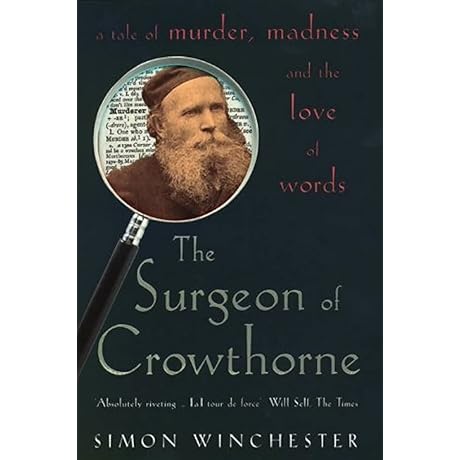
PROS
- Immersive historical account intertwining the life of a revered lexicographer with a chilling murder.
- Unveils the intricate world of dictionary-making and its profound impact on the English language.
CONS
- Pace may be slow for some readers, especially in the early chapters.
- Technical aspects of lexicography, though fascinating, could be challenging for those unfamiliar with the field.
Simon Winchester, in his spellbinding book 'The Surgeon of Crowthorne: A Tale of Murder, Madness and Love of Words,' deftly blends a gripping true-crime narrative with an exploration of language's captivating power. The story centers around Dr. James Murray, the editor of the monumental Oxford English Dictionary, and the enigmatic murderer, William Chester Minor. Winchester seamlessly merges these two seemingly disparate elements, crafting a tale that is both intellectually stimulating and emotionally resonant.
Winchester chronicles the meticulous process of dictionary-making, showcasing the painstaking labor and scholarly passion that go into preserving and evolving the English language. Through Murray's driven pursuit of this linguistic masterpiece, we witness the transformative power of words and their ability to shape our understanding of the world. The author's vivid descriptions and personal anecdotes paint a vibrant picture of this era, immersing readers in the historical context and the lives of those involved. While the pace may be leisurely at times, Winchester's captivating writing style and the inherent fascination of the subject matter more than compensate.
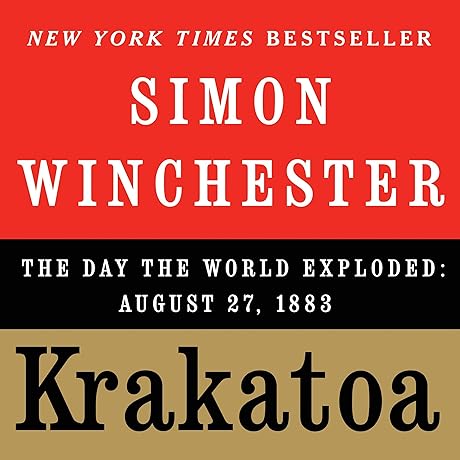
PROS
- Captivating narrative that brings the events of 1883 to life
- Meticulous research and detailed accounts based on personal experiences
CONS
- Some readers may find the scientific explanations a bit too technical
- Despite its gripping account, the book lacks illustrations or maps to enhance visualization
In 'Krakatoa,' Simon Winchester masterfully weaves a gripping tale of the catastrophic eruption of Krakatoa, using his impeccable research and keen eye for detail to transport readers back to the fateful day in 1883. Through vivid descriptions and captivating storytelling, he explores the devastating impact of this volcanic explosion, painting a vivid picture of the human toll and the profound changes it brought to the world.
Winchester's meticulous account is a testament to his dedication to factual accuracy. He meticulously pieces together the events leading up to and following the eruption, relying on personal accounts and scientific data to provide a comprehensive and deeply informative account. 'Krakatoa' serves as a reminder of the immense power of nature and the lasting impact it can have on our planet.

PROS
- Unveils the pivotal role of William Smith in the creation of the first geological map.
- Provides an in-depth analysis of Smith's meticulous observations and groundbreaking theories.
CONS
- May require some prior understanding of geology to grasp the full impact of Smith's work.
- Lacks in-depth discussions on the broader implications of Smith's findings beyond geological science.
Simon Winchester's 'The Map That Changed the World' is a captivating and informative account of the life and work of William Smith, the visionary geologist who revolutionized our understanding of the Earth's past. Winchester meticulously traces Smith's arduous journey as he meticulously collected data, creating the first comprehensive geological map of England and Wales. The book highlights Smith's unwavering determination and innovative spirit, shedding light on the challenges he faced while recognizing the profound impact his work had on shaping modern geology.
Winchester's writing is both accessible and engaging, making this book a valuable resource for anyone interested in the history of science, geology, and the transformative power of one man's unwavering pursuit of knowledge. While it assumes some familiarity with basic geological concepts, the author's clear explanations and vivid storytelling ensure that even those without a scientific background can appreciate the significance of Smith's contributions.

PROS
- Delve into the depths of Chinese history and culture through the lens of the majestic Yangtze River
- Experience a captivating narrative that brings the river's past, present, and future to life
CONS
- The book's length may be overwhelming for some readers.
- Some sections delve deeply into technical details, which may not appeal to all readers.
In 'The River at the Center of the World', Simon Winchester embarks on an extraordinary journey along the Yangtze River, the lifeblood of Chinese civilization. His evocative prose captures the river's grandeur, its historical significance, and its role in shaping the destiny of China.
Winchester's narrative weaves together personal anecdotes, historical accounts, and scientific insights, painting a vivid portrait of the river and the people who live along its banks. By tracing the river's course from its headwaters in the Tibetan Plateau to its mouth at the East China Sea, Winchester offers a captivating glimpse into the heart of China, its past, present, and future.
Simon Winchester's 'Exactly' takes us on a riveting journey into the lives of precision engineers, the architects of our modern world. Through their relentless pursuit of perfection, they crafted tools, machines, and structures that transformed industries and revolutionized our way of life. Winchester weaves a tapestry of anecdotes, technical breakthroughs, and personal sacrifices, painting a vivid picture of these unsung heroes. 'Exactly' is a testament to the human ingenuity and dedication that propelled us into the modern age.
Frequently Asked Questions
What is the main theme of 'Exactly'?
'Exactly' delves into the captivating world of precision engineers and their profound impact on the development of our modern society.
Who is the author of 'Exactly'?
The highly acclaimed author, Simon Winchester, pens this intriguing narrative on the world of precision engineers and their remarkable contributions.
In what year was 'Exactly' published?
Simon Winchester's 'Exactly' was released in 2018, captivating readers with its insightful exploration of precision engineering.
What is the significance of precision engineers?
'Exactly' highlights the crucial role precision engineers play in shaping our world, transforming industries and revolutionizing our daily lives through their meticulous work and relentless pursuit of perfection.
What topics does 'Exactly' cover?
Winchester's 'Exactly' offers a captivating exploration of precision engineering, encompassing topics such as toolmaking, clockmaking, shipbuilding, and the development of groundbreaking technologies.





